We may not have the course you’re looking for. If you enquire or give us a call on 44 1344 203 999 and speak to our training experts, we may still be able to help with your training requirements.
Training Outcomes Within Your Budget!
We ensure quality, budget-alignment, and timely delivery by our expert instructors.
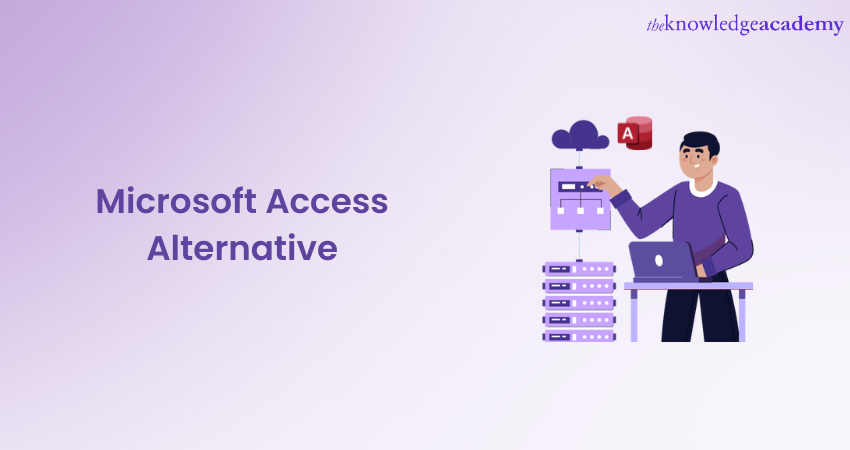
Are you finding Microsoft Access too limited for your growing needs? As your business scales, so do your Data Management requirements, and you might find MS Access falling short in terms of scalability, multi-user collaboration, and web accessibility. Despite its user-friendly interface and powerful features, Access may not always meet the advanced demands of a larger, more dynamic environment.
Why settle for limitations when there are robust alternatives available? Discover how different tools can offer enhanced scalability, real-time collaboration, and advanced functionalities that cater to your evolving needs. What if there’s a perfect fit out there waiting for you? Let’s explore the top 10 Microsoft Access Alternatives.
Table of Contents
1) A brief introduction to Microsoft Access
2) Reasons to look for Microsoft Access Alternatives
a) Scalability
b) Multi-user collaboration
c) Web and mobile accessibility
d) Advanced functionalities
3) Exploring the Microsoft Access Alternatives
4) Conclusion
A brief introduction to Microsoft Access
Microsoft Access is a Database Management System (DBMS) that comes filled with the Microsoft Office suite. It serves as a flexible instrument that allows users to create, manage, and modify relational databases.
Access is known for its user-friendly interface, which includes a variety of wizards, templates, and drag-and-drop capabilities, making it accessible to users who are unfamiliar with SQL or database architecture.
One of Microsoft Access's greatest characteristics is its ease of use in creating forms, queries, and reports. This makes it the preferred option for small businesses, academic researchers, and even larger corporations with small database requirements.
Reasons to look for Microsoft Access alternatives
Here are the reasons to look for ms access alternative:
Individual users, small businesses using microsoft access is a very common choice for a database management system for a long time. However, as technology evolves and Data Management needs become more complex, there are several reasons why one might consider Alternatives to Microsoft Access. Here are the reasons described as follows:
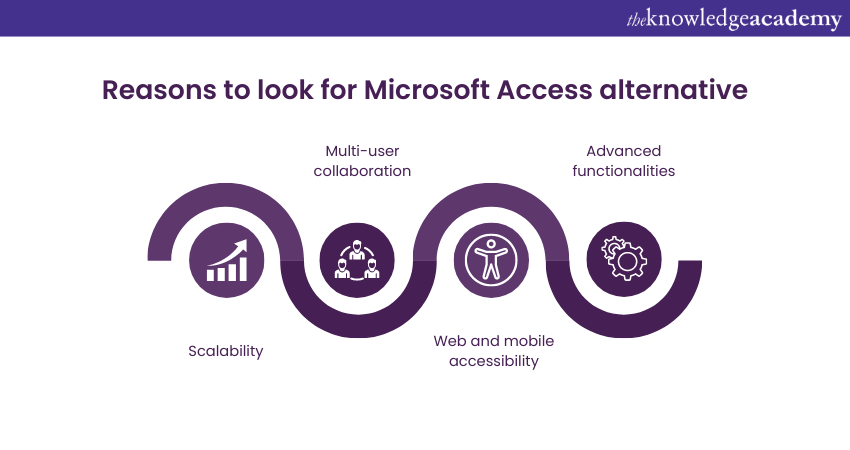
Scalability
First and foremost, scalability can be a significant limitation for growing businesses. Microsoft Access is not designed to handle very large datasets or high transactional volume, which means as your business scales, you may find Access becoming slower and less efficient. You may experience lag time in queries and limitations on the amount of data you can store, which can become a bottleneck for business growth.
Multi-user collaboration
Access also presents challenges when it comes to multi-user collaboration. While it does offer some multi-user functionalities, it is not built to handle real-time, simultaneous editing, or data entry by multiple users. This can result in data integrity issues and conflicts, particularly when dealing with larger teams.
Web and mobile accessibility
In today's mobile-first world, the ability to access, manage, and update data on-the-go is crucial. Microsoft Access falls short in this aspect because it is primarily a desktop-based application. The lack of native cloud and mobile support means that your data is not as accessible as it could be, limiting real-time decision-making capabilities.
Advanced functionalities
While Access is user-friendly and offers basic functionalities for Database Management, it lacks many advanced features that are present in other DBMS platforms. For instance, it has limited support for more complex SQL queries and stored procedures. The reporting tools are also basic when compared to specialised Business Intelligence tools.
Fetch, process and modify data by signing up for the Introduction to Database Training now!
Exploring the Alternatives to Microsoft Access
Here is a list of the best alternative of microsoft access:
ClickUp
ClickUp is a cloud-based productivity platform. While it is not a direct Alternative to Microsoft Access as a DBMS, serves as an alternative tool for managing data and workflows in a project management context.
It is designed to streamline tasks, goals, and communication within a team, offering a centralised space for varied types of Data Management and collaboration. Here are its top features and limitations highlighted as follows:
Best features:
a) Customisation: ClickUp allows you to create custom fields, statuses, and tags, enabling a highly personalised workspace tailored to your project needs.
b) Multiple views: You can view your data as a list, board, or calendar, allowing for flexible and dynamic Data Management and planning.
c) Real-time collaboration: Features like assigned comments and real-time chat make it easy for teams to collaborate in the platform.
d) Integrations: ClickUp offers a wide range of integration with other tools, namely Google Drive, Slack, and even GitHub, making it a versatile choice for those already using other platforms.
Explore the Advantages and Disadvantages of Microsoft Access! Understand its strengths and limitations to make an informed choice for your database needs.
e) Time tracking: Built-in time tracking features help monitor how much time is spent on specific tasks, aiding in productivity analysis.
Limitations:
a) Learning curve: With its multitude of features, it can come across as overwhelming for new users to navigate the platform efficiently.
b) Performance: Users have reported that the platform can get sluggish as the amount of stored data and ongoing tasks increases.
c) Limited data querying: Unlike Microsoft Access, ClickUp is not built for complex data queries or relational Database Management, making it less suitable for those specific needs.
Build and deploy a high-scale, performance-oriented Database by signing up for the MongoDB Developer Course now!
MongoDB
MongoDB is a NoSQL Database Management System that serves as an alternative to traditional relational Databases like Microsoft Access. It is designed to handle large volumes of unstructured data, making it well-suited for modern web applications, real-time analytics, and Internet of Things (IoT) applications.
Here are its top features and limitations highlighted as follows:
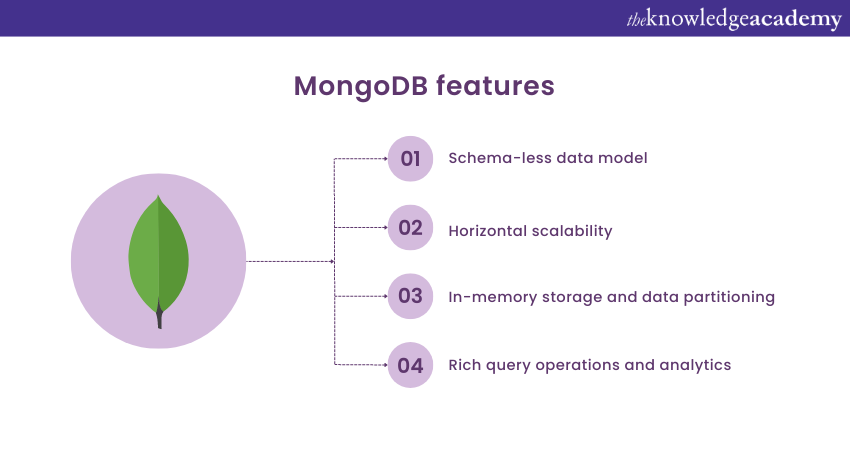
Best features:
a) Schema-less: Unlike Access, MongoDB allows for a flexible, schema-less data model, meaning you can insert records without defining their structure first. This allows for quick iterations and agile development.
b) Scalability: MongoDB is designed to scale horizontally by splitting data across multiple servers. This ensures that the system can handle huge data sets with enormous processing needs.
c) High performance: MongoDB is designed to run quickly, even with huge datasets, with features like in-memory storage and data partitioning.
d) JSON-like documents: Data is saved in a JSON-like format (BSON), which is both human and machine-readable, making data manipulation and integration easier.
e) Rich query language: Despite being a NoSQL database, MongoDB provides a wide range of query operations and supports real-time analytics and complicated aggregations.
Limitations:
a) ACID limitations: MongoDB only guarantees Atomicity, Consistency, Isolation and Durability (ACID) properties at the document level, which may be insufficient for transactions requiring complex joins and multi-record ACID compliance.
b) Learning curve: For users accustomed to SQL and relational Databases, there can be a steep learning curve to fully grasp MongoDB's document-based model.
c) Cost: While there is a free community version, the features of MongoDB’s enterprise version, needed for large-scale applications, come at a cost.
Build and deploy a high-scale, performance-oriented Database by signing up for the MongoDB Developer Course now!
DBeaver
DBeaver is a free, open-source Database Management tool that offers an Alternative to Microsoft Access for users who require more extensive Database functionalities. Unlike Access, which is limited to its own DBMS, DBeaver supports a wide array of Database types including MySQL, PostgreSQL, SQLite, Oracle, and many more.
Here are its top features and limitations highlighted as follows:
Best features:
a) Multi-Database support: One of the standout features of DBeaver is its ability to connect to numerous types of Databases, allowing for greater flexibility in Database Management tasks.
b) Extensible: Designed as an open-source tool, it offers a high level of customisation and extensibility. Users can add plugins or even develop their own extensions to meet specific needs.
c) SQL support: DBeaver has robust SQL editing and execution capabilities, offering features like syntax highlighting, auto-completion, and saved scripts, which can be a boon for those who work extensively with SQL queries.
d) Data visualisation: It provides sophisticated data visualisation features, including ER diagrams and customisable reports, making data analysis easier.
e) Import/export features: DBeaver offers strong data migration tools, allowing you to import data from various formats and export to SQL, CSV, and other formats.
Limitations:
a) Learning curve: With its extensive features and functionalities, DBeaver can be intimidating for beginners who are not familiar with SQL and Database Management.
b) Resource intensive: Because it's designed to handle complex tasks, it can be more resource-intensive compared to lightweight solutions like Microsoft Access.
c) Limited guidance: Being an open-source tool, it lacks the structured customer support and detailed documentation that comes with proprietary solutions.
Elevate your productivity with our Microsoft Office 365 Masterclass – unlock a world of digital possibilities!
OpenOffice Base
OpenOffice Base is an open-source Relational Database Management System (RDBMS) that comes as part of the Apache OpenOffice suite. Designed as a free Alternative to Microsoft Access, it offers a range of functionalities for creating and managing Databases, forms, queries, and reports.
Here are its top features and limitations highlighted as follows:
Best features:
a) Cost-effective: Being open-source, OpenOffice Base is free to use, making it a budget-friendly option for small businesses and individual users.
b) Cross-platform compatibility: It runs on multiple Operating Systems, including Windows, macOS, and offering greater flexibility than Microsoft Access, which is Windows-centric.
c) User-friendly interface: Much like Access, Base offers a graphical interface designed to make it easier to create and manage Databases without extensive SQL knowledge.
d) Integration with OpenOffice suite: Base seamlessly integrates with other Apache OpenOffice components like Writer and Calc, facilitating easier data import/export and reporting capabilities.
e) SQL support: For advanced users, OpenOffice Base provides direct SQL editing capabilities, allowing more complex queries and data manipulation.
Master Microsoft Access Data Types! Learn how to organize and manage your data effectively for optimal database performance. Start now!
Limitations:
a) Limited scalability: OpenOffice Base may not be suitable for managing very large datasets or high-transaction environments, much like Microsoft Access.
b) Community support: Being open-source, it lacks the robust customer support that you might expect from a paid, proprietary solution.
c) Feature set: While it offers a decent range of functionalities, it lacks some of the more advanced Database Management features found in enterprise-level solutions.
Airtable
Airtable is a cloud-based Database Management solution that combines the simplicity of a spreadsheet with the power of a relational Database. It offers a more user-friendly and visually engaging alternative to traditional Database systems like Microsoft Access.
Here are its top features and limitations highlighted as follows:

Best features:
a) User-friendly interface: Airtable's spreadsheet-like interface makes it incredibly easy for users to add, organise, and manipulate data, even with little to no Database experience.
b) Real-time collaboration: Being cloud-based, Airtable allows for seamless, real-time collaboration. Many users can work on the same Database, making updates that are instantly reflected for all team members.
c) Customisation: Airtable offers a wide range of templates and views, including grid, calendar, Kanban, and gallery views, allowing users to customise the interface to suit their needs best.
d) API and integrations: Airtable provides a robust API and integrates with various other platforms and apps like Slack, Google Drive, and Zapier, making it highly adaptable to different workflows.
e) Scalability: Airtable is designed to scale with your needs, with pricing plans that offer additional features like extra records, advanced automation, and more collaboration options.
Limitations:
a) Limited query language: Unlike Access, which has full SQL support, Airtable's querying capabilities are somewhat limited, making it less suitable for complex data manipulation tasks.
b) Cost: While there is a free version, more advanced features and larger storage capacities require a subscription, which can get expensive for larger teams.
c) Internet dependence: Being cloud-based means you must have a reliable internet connection to access your Databases, which could be a limitation in certain scenarios.
TeamDesk
TeamDesk is a web-based Database software aimed at simplifying business Data Management. This platform serves as an Alternative to Microsoft Access by offering a more collaborative and accessible approach to handling data, particularly for remote or distributed teams.
Here are its top features and limitations highlighted as follows:
Best features:
a) Ease of use: TeamDesk offers a user-friendly interface with pre-built templates that make it easy to create custom databases without any programming knowledge. This is especially beneficial for businesses without dedicated IT resources.
b) Real-time collaboration: Being a cloud-based solution, TeamDesk facilitates real-time data sharing and collaboration, allowing team members to update and access information simultaneously, regardless of their location.
c) Flexibility and customisation: TeamDesk provides highly customisable features like custom forms, fields, and views, as well as workflow automation, making it a versatile choice for different business needs.
d) Scalability: The platform is designed so that it grows with your business. You can easily add new users and increase storage capacity as needed, making it a scalable solution.
e) Security and reliability: TeamDesk places a strong emphasis on data security with features like SSL encryption and regular backups, providing peace of mind regarding data integrity and safety.
Limitations:
a) Limited offline access: Being web-based, TeamDesk requires a reliable internet connection, limiting offline accessibility to your Databases.
b) Cost factor: While TeamDesk offers a lot of functionalities, these come at a subscription cost, which may be a consideration for smaller businesses or startups.
c) Limited advanced features: Although it covers many basic and intermediate Database functions, TeamDesk may lack some of the advanced querying and data analysis tools that other, more specialised Database platforms offer.
SingleStore
SingleStore (formerly known as MemSQL) is a distributed, RDBMS designed for high-performance, scalable data processing and analytics. It serves as an alternative to traditional Database systems like Microsoft Access, particularly for organisations that require real-time analytics and high-speed transactions.
Here are its top features and limitations highlighted as follows:
Best features:
a) High performance: SingleStore is designed for speed, leveraging in-memory and disk-based storage to ensure fast data retrieval and manipulation. This makes it ideal for real-time analytics and transaction-heavy applications.
b) Scalability: The platform is built to scale out, distributing data throughout multiple nodes in a cluster, which can be both on-premises and in the cloud. This offers tremendous flexibility in managing growing data sets.
c) SQL compatibility: Unlike many NoSQL Databases, SingleStore offers full SQL support, making it easier for organisations to transition from traditional RDBMS platforms.
d) Data integration: SingleStore provides real-time data ingestion from various sources, including Kafka streams, making it a versatile option for diverse data pipelines.
e) Concurrency support: It is engineered for high-concurrency scenarios, allowing multiple operations to be executed simultaneously without locking resources, thus improving operational efficiency.
Limitations:
a) Complexity: The high-performance features come with a level of complexity that might be overwhelming for small businesses or users with limited technical expertise.
b) Cost: While SingleStore offers robust capabilities, the cost of scaling and licensing can be high, particularly for enterprise-level deployments.
c) Hardware requirements: For optimal performance, SingleStore may require specialised hardware configurations that can add to the overall costs and logistical considerations.
Google Sheets
Google Sheets is a web-based spreadsheet that, while not a traditional Database Management system like Microsoft Access, is often used for lightweight Data Management tasks. As part of Google Workspace, it offers a unique set of features geared toward collaboration and ease of use.
Here are its top features and limitations highlighted as follows:
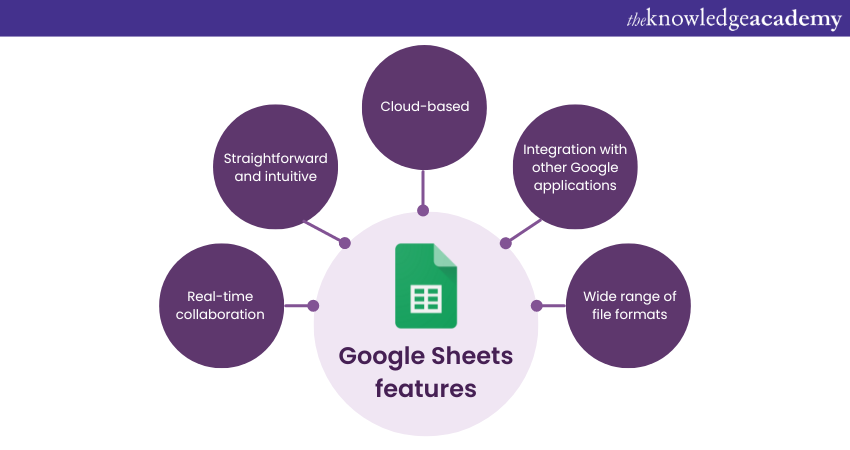
Best features:
a) Real-time collaboration: Google Sheets excels in enabling real-time collaboration among multiple users. Team members can work simultaneously on the same sheet, making changes that are instantly visible to all.
b) Ease of use: The User Interface (UI) is quite straightforward and intuitive, requiring little to no training. This makes it accessible to users who are not experts in Data Management.
c) Cloud-based: Being cloud-based means you can access your sheets from any device or anywhere you have internet connectivity, offering immense flexibility.
d) Integration and APIs: Google Sheets can be easily integrated with other Google Workspace applications and offers APIs for custom integration with other software.
e) Data import and export: Google Sheets supports a wide range of file formats for data import and export, including CSV, Excel, and more, making it versatile for various Data Management tasks.
Unlock the full potential of Microsoft Access Functions! Streamline your data management and enhance efficiency. Start learning today!
Limitations:
a) Limited data analysis tools: While Google Sheets offers basic data manipulation and formulas, it lacks the advanced querying and data analysis capabilities of a dedicated Database software like Microsoft Access.
b) Scalability: Google Sheets has row and column limits, making it unsuitable for handling very large datasets.
c) Limited security features: While it offers basic sharing controls, it lacks the more advanced security features that a dedicated Database system might offer.
Add, average and filter data with formulas, by signing up for our Google Sheets Masterclass now!
Axisbase
Axisbase is a Database software that aims to provide a comprehensive solution for businesses and individual users who require Database Management capabilities. Positioned as an Alternative to Microsoft Access, Axisbase offers both desktop and web-based options for data storage, retrieval, and manipulation.
Here are its top features and limitations highlighted as follows:
Best features:
a) Ease of use: Axisbase offers a user-friendly interface designed to make Database creation and management accessible, even for those with limited technical experience.
b) Customisation: The software provides extensive customisation features, allowing users to create tailored forms, reports, and workflow processes to meet specific requirements.
c) Multi-platform support: Axisbase is available as both a desktop application and a web-based solution, providing flexibility for users to access their Databases from various devices.
d) Integrated Development Environment (IDE): For more advanced users, Axisbase offers an IDE that allows custom coding for more specialised Database applications.
e) Cost-effective: Axisbase offers a free version with essential features, making it a cost-effective option for small-sized businesses and personal use.
Limitations:
a) Limited community and support: Being less popular than other Database systems like Microsoft Access or SQL Server means fewer community resources and third-party integrations are available.
b) Performance constraints: For very large datasets and complex queries, Axisbase may not perform as efficiently as more robust, enterprise-grade Database systems.
c) Learning curve: While Axisbase aims to be user-friendly, its breadth of features can present a learning curve, particularly for those new to Database Management.
Create and manipulate data with queries by signing up for the SQL Training now!
SQLite
SQLite is a self-contained, serverless, and zero-configuration SQL Database engine widely used in embedded systems and mobile applications. It offers a unique set of features as an alternative to more robust Database systems like Microsoft Access.
Here are its top features and limitations highlighted as follows:
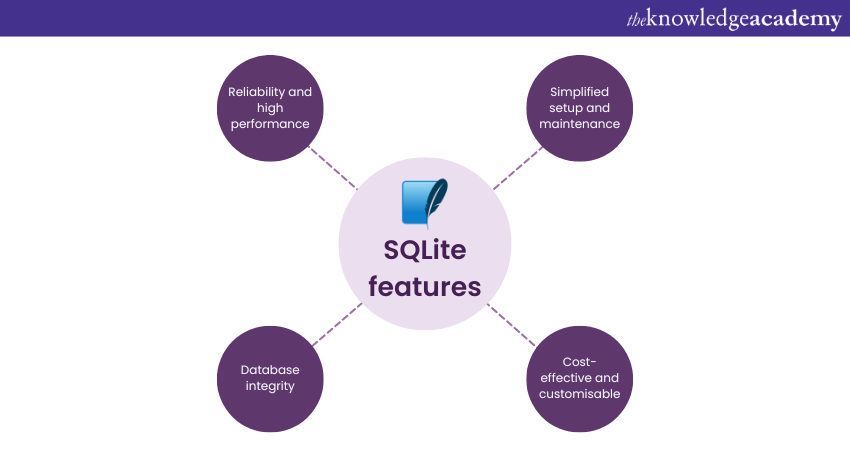
Best features:
a) Portability and simplicity: SQLite is remarkably lightweight, with the whole Database stored in a single file, making it highly portable. The absence of a separate server process simplifies both setup and maintenance.
b) Open source: Being open source, it is cost-effective and allows for customisation and in-depth scrutiny of the code base for specific needs.
c) ACID compliant: SQLite offers full ACID compliance, ensuring Database integrity even in the face of system crashes or power failures.
d) Wide adoption: SQLite is used in numerous applications, from mobile apps to desktop software, demonstrating its reliability and performance capabilities.
Limitations:
a) Concurrency: SQLite is not designed for high-concurrency, multi-user environments. Write operations lock the entire Database, which can lead to performance bottlenecks.
b) Limited built-in functions: Unlike Access, SQLite lacks a graphical user interface and many built-in functions, requiring users to build custom solutions for complex queries and reporting.
Master Microsoft Office with our comprehensive Microsoft Office Training!
Conclusion
Exploring Alternatives to Microsoft Access can open up new possibilities for Database Management, whether you need real-time collaboration, scalability, or specialised functionalities. Each alternative comes with its unique set of features and limitations, offering various options to suit different business needs and technical skill sets.
Learn to present information from a Database by signing up for the Microsoft Access Masterclass now!
Frequently Asked Questions

Google doesn't offer a direct equivalent to Microsoft Access. However, Google's Cloud Platform provides databases like Cloud SQL and Firestore, which can serve similar purposes for managing data.

Yes, Microsoft Access is included in some Office 365 subscription plans. It's specifically available in those geared towards business and enterprise users, offering Database Management capabilities alongside other Office applications.

The Knowledge Academy takes global learning to new heights, offering over 30,000 online courses across 490+ locations in 220 countries. This expansive reach ensures accessibility and convenience for learners worldwide.
Alongside our diverse Online Course Catalogue, encompassing 17 major categories, we go the extra mile by providing a plethora of free educational Online Resources like News updates, Blogs, videos, webinars, and interview questions. Tailoring learning experiences further, professionals can maximise value with customisable Course Bundles of TKA.

The Knowledge Academy’s Knowledge Pass, a prepaid voucher, adds another layer of flexibility, allowing course bookings over a 12-month period. Join us on a journey where education knows no bounds.

The Knowledge Academy offers various Microsoft Office Training, including Microsoft Access Training, Microsoft Office 365 Training, Microsoft PowerPoint Training and Microsoft Teams Training. These courses cater to different skill levels, providing comprehensive insights into Business Process Modelling Tools.
Our Office Applications Blogs cover a range of topics related to Microsoft Access, offering valuable resources, best practices, and industry insights. Whether you are a beginner or looking to advance your Microsoft Access skills, The Knowledge Academy's diverse courses and informative blogs have you covered.







 Top Rated Course
Top Rated Course




 If you wish to make any changes to your course, please
If you wish to make any changes to your course, please


